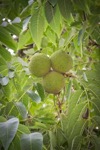| Scientific: | Juglans nigra |
|---|---|
| Other: | Black Walnut |
| Family: | Juglandaceae |
| Synonym: | Juglans cinerea |
Black Walnut is used in western herbalism primarily as an antimicrobial herb, and in particular as an anti-parasitic. Research shows it contains naphthoquinones (e.g. juglone) that can disrupt various metabolic pathways in a variety of micro-organisms. Research supports its antibacterial and antifungal properties.
Green husk of the nuts and leaves produce napthoquinones that have antimicrobial and anticancer actions, likely through disrupting oxidative phosphorylation.
Infection
• bacterial
- H. Pylori
- tuberculosis
• fungal - candida- dermatophytes
• worms
• roundworms
• pinworms
• parasites (Leishmaniasis)
Gastrointestinal
• chronic constipation
Cancer
• various cancers
• leukemia
• Antimicrobial
• antibacterial
• Antiviral
• Antiparasitic
• Astringent
• Anthelmintic
• Vermifuge
• Anticancer
• Bitter
• Laxative
• Naphthaquinones (E.g. Juglone, Plumbagin )
• Tincture: 1-2 ml tid
• Pregnancy & Lactation • contra-indicated. Likely unsafe and insufficent research available.
- Iron supplements • may reduce the absorption of non-heme iron. Take iron supplements a few hours apart.
• Blood thinners • black walnut may affect the blood's ability to clot, and could interfere with antiplatel
Barnes J, Anderson LA, Phillipson JD. Herbal Medicines, 3rd ed. London: Pharmaceutical Press, 2007.
Bone K. Principles and Practice of Phytotherapy. Edinburgh: Churchill Livingstone, 2000.
Bone K. A Clinical Guide to Blending Liquid Herbs: Herbal Formulations for the Individual Patient. St Louis, MO: Churchill Livingstone, 2003.
Brinker F. The Toxicology of Botanical Medicines, 3rd ed. Sandy, Oregon: Eclectic Medical Publications, 2000.
Felter HW, Lloyd JU. King's American Dispensatory. 1898. http://www.ibiblio.org/herbmed/eclectic/kings/main.html. Accessed: August 19, 2006.
Hoffman D. Medical Herbalism. Rochester, Vermont: Healing Arts Press, 2003.
Weiss RF. Herbal Medicine. Beaconsfield, England: Beaconsfield Publishers Ltd, 1988.
Williamson EM, ed. Major Herbs of Ayurveda. Edinburgh: Churchill Livingstone, 2002
Disclaimer: This content is subject to change. The information is intended to inform and educate; it does not replace the medical evaluation, advice, diagnosis or treatment by a healthcare professional. www.nhpassist.com © 2014 NDAssist Inc. and/or its affiliates. All rights reserved.

|
Black Walnut
SummaryBlack Walnut is used in western herbalism primarily as an antimicrobial herb, and in particular as an anti-parasitic. Research shows it contains naphthoquinones (e.g. juglone) that can disrupt various metabolic pathways in a variety of micro-organisms. Research supports its antibacterial and antifungal properties. IndicationsSign in requiredActionsSign in requiredConstituentsSign in requiredPosologySign in requiredSafetySign in requiredInteractionsSign in requiredReferencesSign in required |
|---|